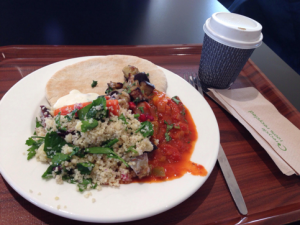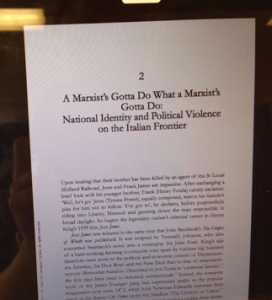

9 am: Screening of Once Upon a Time in the West for Popular European Cinema: Italy 1960
This particular Tuesday started early with a three-hour screening of Sergio Leone’s ‘spaghetti western’ Once Upon a Time in the West from 1968. Every module includes screenings, so we watch at least 3 or 4 films per week during term time. The films we watch hugely vary: yesterday in Film and New Media, a selection of short videos relating to the topic of remediation – including a re-edited version of The Wizard of Oz, now with every spoken word organised alphabetically – and later this week, Microhabitat, a South Korean independent debut by female director Jeon Go-woon about a woman’s choice between paying rent or quitting her smoking and whisky-drinking habit. While it’s possible to choose similar modules to go deeper into a particular area – for example, French cinema – I love the contrasts and, often, surprising similarities that come with studying Popular European Cinema: Italy 1960 and Korean Cinema at the same time.
12 pm: Lunch at Bush House vegan cafeteria

After the screening, I went to the 8th floor of Bush House across the street from the main Strand campus to buy lunch. Since King’s is located in central London, there are many options suiting different tastes and budgets (even though London is not a cheap city to live in!). Today, I chose a vegan aubergine shakshuka (see photo) in King’s plant-based cafeteria.
1 pm: Reading

Since the Film Studies course is theory-based, there is a lot of reading involved. In order to discuss Once Upon a Time in the West in my two-hour seminar tomorrow, I read the assigned texts on the concept of the popular in European film studies, opera and cinema in the Italian context, Marxism and frontier-ideology in the US and Italy (see photo), and Americanism in the Italian western. Most of my time, therefore, goes into reading printed course packs or online documents on various topics that often go beyond film in the strictest sense, but always relate back to cinema. Usually, I sit in the various study rooms and libraries around campus, sometimes with my friends from the course. We then discuss the readings and the film in one or two-hour seminars (dependent on whether the module includes a lecture) in groups of 10-20 students led by an academic or graduate teaching assistant. For the practical side of film, most of us are involved in extra-curricular activities.
3 pm: Meeting with dissertation supervisor / personal tutor
In third year, every Film Studies student must write a dissertation: a 10,000-word thesis on a topic of our choice with the help of a supervisor within the department. Since my supervisor is also my personal tutor, I had a meeting with him talking through both my argument on the queering of genre in The Handmaiden (Park Chan-wook, 2016) and Killing Eve, and my MA application. After this, I walked home, grocery shopping on the way, and read the rest after dinner.
Read More
Click here to read Jack’s post on the top 5 things about studying a Film Studies degree.
Here’s the link to the KCL Film Studies department page.

Leave a Reply